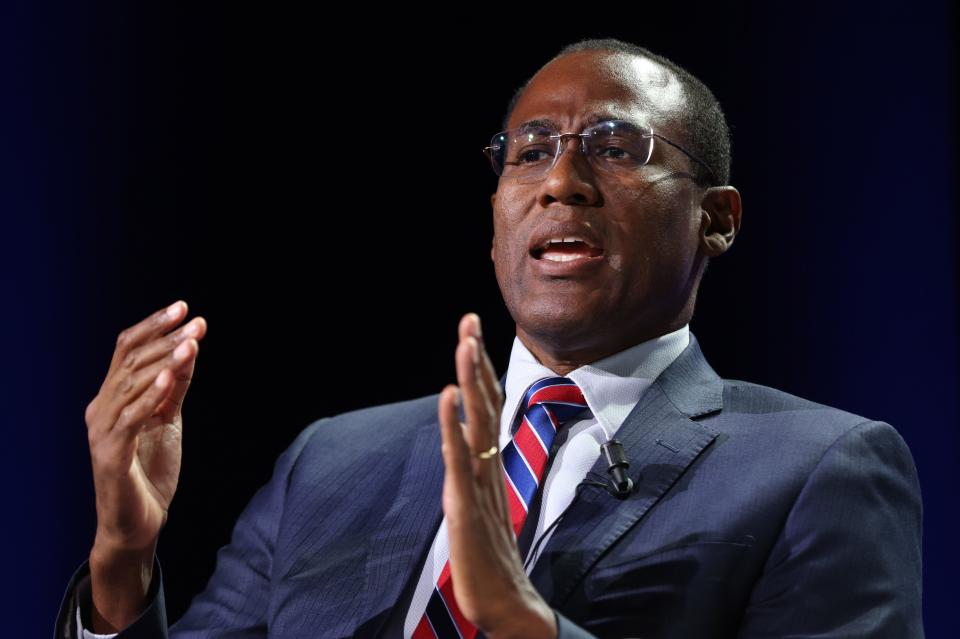Hurricane Beryl Tests Jamaica’s $1.6 Billion Disaster Safety Net

(Bloomberg) -- As Hurricane Beryl churns toward Jamaica with a rising death toll and winds topping 145 miles per hour, it will put the country’s $1.6 billion disaster strategy to the test.
Most Read from Bloomberg
Biden Struggles to Contain Mounting Pressure to Drop Out of Race
China Can End Russia’s War in Ukraine With One Phone Call, Finland Says
Jamaica, among the most prepared nations in the Caribbean for killer hurricanes, has offloaded risk onto the credit and insurance markets. In April, the World Bank priced a $150 million catastrophe bond that will pay out depending on the intensity and path of a storm. The country also has insurance policies and lines of credit that it can tap in the wake of a disaster.
“We have put ourselves in a position that we don’t have to be scrambling after a natural disaster to figure out where the resources are going to come from,” Finance and Public Service Minister Nigel Clarke said in a telephone interview as Beryl took aim at the island. “Our hope and prayer is that we do not need these, and that our instruments that only trigger under most severe hurricanes are not triggered.”
Nations across the Caribbean are building protections from climate risks into their portfolios as storms increase in frequency and power. Barbados added a clause into its dollar bonds due in 2029 that defers payment for up to two years in the case of a natural disaster. The Caribbean Development Bank is also mulling a plan that would trigger moratoriums on loan payments when its borrowers are slammed by storms.
On Wednesday, Beryl was a powerful Category 4 hurricane that had already carved a path of destruction through the Caribbean. The storm has killed at least six people and done hundreds of millions — likely billions — of dollars worth of damage in Grenada, St. Vincent and the Grenadines and Barbados.
When it passes over or near Jamaica on Wednesday around midday, forecasters expect it to do at least $1 billion in additional damage. Beyond the financial impact, the potentially fatal storm will also leave the island facing a massive cleanup and recovery effort.
Along with the catastrophe bond that runs through 2027, Jamaica has a $285 million contingency credit through the Inter-American Development Bank, $114 million in parametric insurance and about $30 million stashed away in a disaster fund, Clarke said. In addition, it has access to a $968 million precautionary liquidity line through the International Monetary Fund.
It would likely take a devastating Category 5 to trigger all those contingencies, Clarke said.
Jamaica has coverage for about 5% of its gross domestic product (excluding the IMF line of credit), while losses from prior disasters averaged between 3% and 8%, according to Katrina Butt, a senior economist at AllianceBernstein in New York.
However, even garden variety storms have “an economic impact as the tourism sector is hurt and debt levels rise,” she said. “Beryl could leave more extreme devastation and losses in excess of the country’s insurance coverage, and severe infrastructure damage could hamper economic activity for an extended period of time.”
The storm also threatens the nation’s economic comeback. Once among the region’s most volatile economies, Jamaica has driven its debt-to-GDP ratio to its lowest levels in 30 years and has had 12 consecutive quarters of economic growth — the second-longest stretch on record.
Jamaica’s sovereign bonds trade largely above par, with notes due in 2028 quoting at 102 cents on the dollar. The extra yield investors demand to hold the debt over similar US Treasuries has fallen over 30 basis points over the past year, according to a JPMorgan index.
Clarke said the layers of protection are a shield against Jamaica falling back into a period of economic instability.
“We know these shocks are going to happen, including natural disasters,” he said. “And we have to put ourselves in a position where we can recover quickly from them, so that our future can be distinctly different from our past.”
Most Read from Bloomberg Businessweek
China’s Investment Bankers Join the Communist Party as Morale (and Paychecks) Shrink
Dragons and Sex Are Now a $610 Million Business Sweeping Publishing
The Fried Chicken Sandwich Wars Are More Cutthroat Than Ever Before
For Tesla, a Smaller Drop in Sales Is Something to Celebrate
©2024 Bloomberg L.P.

 Yahoo Finance
Yahoo Finance 